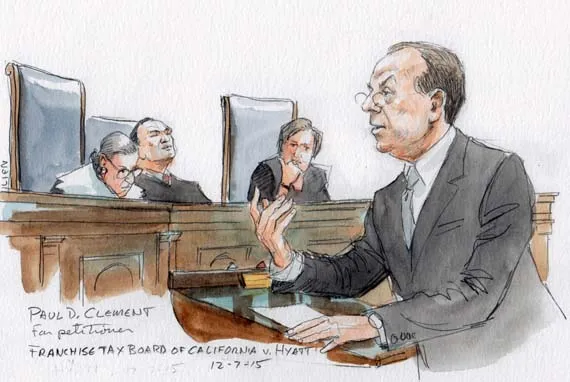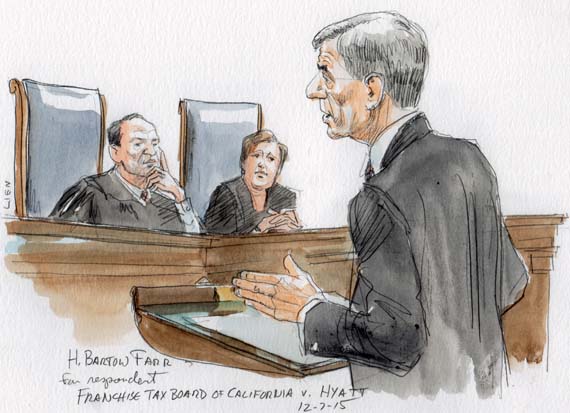Argument analysis: Seeking two-century-old guidance

on Dec 7, 2015 at 3:33 pm
Analysis
Except for the fact that no one was wearing buckled shoes, knee breeches, and lace cuffs, an argument in the Supreme Court Monday might have been a reenactment of a day at the Constitutional Convention in Philadelphia 228 years ago. It was all about what the states gave up, and did not give up, as part of the bargaining over a new Constitution.
That is what has become of the case of Franchise Tax Board of California v. Hyatt, a prolonged, multi-million-dollar tax fight between California authorities and a Nevada inventor. It took the Court and the lawyers back to constitutional basics, because the California agency is trying to gain immunity as a “sovereign state” from being sued in Nevada state court by the wealthy inventor, Gilbert P. Hyatt.
One heard frequently about how the states, fretting over being haled into court to pay off their debts from the Revolutionary War, wanted assurances that that would not happen. And one heard just as often about how the states still had plenty of opportunity, as part of the Union, to protect their own interests by making compacts among themselves to respect each other’s sovereignty.
Which, the Justices and lawyers pondered, was the “plan of the Convention”? Not what the Founders would say if they were in the courtroom today, but what did they actually say that still rings true? Everyone, it seemed, would agree that it would be a momentous decision if the Court were now to acknowledge a broad new form of mutual immunity to the legal processes of sister states. But, if first impressions count, that may be the outcome.
At stake is the Court’s continuing adherence to, or overruling of, the 1979 decision in Nevada v. Hall, allowing this very kind of cross-border court suits against neighboring states. California’s main taxing agency is asking the Court explicitly to cast aside that precedent.
As the argument unfolded, it seemed that the question of state immunity in each other’s courts came down to a stark either/or choice: they get immunity because that is what the Constitution intended them to have, or they are left to self-help in a system that might be respectful, but might actually turn out to be spiteful. As that choice loomed, with the Court divided between them, the natural response was to look to Justice Anthony M. Kennedy as a potential tie-breaker, as he so often is.
Kennedy made his choice clear early, after Justice Elena Kagan appeared to embrace the self-help alternative. States, she said, are on a par with each other, joined in a kind of “mutuality” so that “if one state does something to you that you don’t like, you can turn it around and do it to them. . . . If you’re going to treat me like that, I’m going to treat you like that.”
To Kennedy, at least, that sounded quite heroic, and disturbing. He asked the states’ defender, Washington, D.C., attorney Paul D. Clement: “Is there anything in our jurisprudence that says states can protect each other by retaliating against each other?” Clement, of course, quickly embraced the thought. The Founders, he noted, had just come through the experience of the Articles of Confederation, which he called “a race to the bottom” with the potential for one state’s courts ruling against neighboring states.
It soon became clear that other of the more liberal Court members were sympathetic with retaining the 1979 precedent: Justices Ruth Bader Ginsburg and Sonia Sotomayor, in particular. As the hearing went on, Justice Stephen G. Breyer gave some loose hints that he probably was in their camp.
Sotomayor wondered why the states, if they were really troubled about being sued in sister states’ courts, had not, after all this time, made a deal to respect each other’s sovereignty. Clement quickly replied that that would be “burdensome” but, in any event, they had no need to do so, because they already had a solution to the problem: “That’s the Constitution.”
After the hearing wandered off into conjecture about foreign governments’ immunity and how that might bear on the dispute in this case, the discussion turned back to talk among the liberals about the states having the capacity to take care of themselves.
The lawyer for the taxpayer who had sued the California agency in Nevada court — Washington attorney Bartow H. Farr — opened his side of the argument by urging the Court to leave the Nevada v. Hall precedent intact. Picking up on the line of argument that the liberal Justices had been pursuing, he contended that the Constitution as it has existed allows the states sufficient opportunity to rely upon “the ordinary political processes” to make a compact to respect each other’s “absolute immunity” without having the Supreme Court create it for them.
Kennedy sat forward, and rejoined the argument, energetically. He said that leaving it to the states to handle the immunity question “seems to me quite disruptive of the Union. . . . Maybe they would freeze other states out. You would have states bargaining with each other. It seems to me that that causes great dissension.”
If, for example, the California Franchise Tax Board had decided to collect taxes from people all over the country, Kennedy suggested, the other states might say “let’s leave California out of this agreement, but we’ll agree with ourselves. That seems to me highly disruptive.”
Farr tried to answer by noting that forty-five states were supporting the Tax Board as amici in this case, which Farr interpreted to mean that there were few states “outside the circle.” Kennedy reacted sharply: “Do you say we’re just going to throw the states back on themselves, all the states negotiate with each other? That’s not part of our constitutional tradition at all.”
For a member of the Court who so frequently praises the sovereignty of the states, it was a revealing remark about how Kennedy may see the Constitution as a unifying document, not one that pits the states against each other.
Farr did not give in, however, continuing to insist that the states do have sovereignty within their own borders, and arguing that the Constitution respects that, too. What they were concerned about at the Philadelphia Convention, he said, was fear of being sued in federal courts, and the Eleventh Amendment took care of that fear.
Late in his argument, Justice Samuel A. Alito, Jr., got involved. He suggested that Farr essentially was arguing that, no matter how hostile one state was toward a neighboring state, the Constitution would not mandate equal treatment. “That argument,” said Alito ominously, “seems to point to the need to overrule Nevada v. Hall.”
During Farr’s time at the lectern, Breyer suggested that he was bothered about how Nevada interpreted its sovereignty: insisting that its courts could try a citizen’s lawsuit against an agency of a neighboring state, but refuse to give that agency the same legal protection that it gives to agencies in his own state. It was clear that Breyer was having some trouble with the scope of the sovereignty claim, finding himself to be somewhat skeptical about having the Constitution dictate sovereignty without making the states equal in the bargain.
It was clear evidence that this case, an otherwise mundane fight over alleged tax evasion, was forcing the Justices to think at a very basic level about what was at stake, constitutionally. A simple overruling of Nevada v. Hall might turn out to be not so simple, after all.




